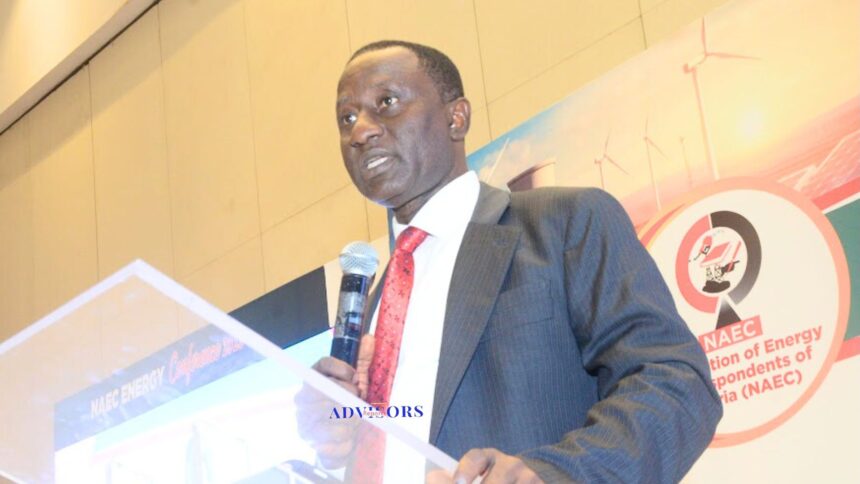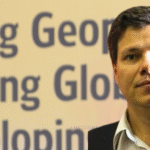… warns Nigeria risks becoming dumping ground for green tech, reveals inaction could cost jobs, industrial growth
…recommends establishment of National energy transition academy
Oredola Adeola
Dr. Uche Ogah, President of Masters Energy Group, has challenged the Federal Government to include the mining sector in the National Economic Council, arguing that it remains a major revenue source crucial to Nigeria’s economic diversification drive.
He made this known in his address as the Chairman of the NAEC Energy Conference 2025, while commenting on the theme, “Nigeria’s Energy Future: Exploring Opportunities and Addressing Risks for Sustainable Growth.”
Advisors Reports found that sectors frequently featured in National Economic Council (NEC) deliberations include agriculture, health, industry and trade, energy, infrastructure, finance, human development, and ease of doing business.
According to him, discussions around Nigeria’s mining sector and its vast potential have been largely neglected, with national attention still fixated on oil and gas.
He recalled, “As a former Minister, I once presented bar gold to the late President Muhammadu Buhari to demonstrate that Nigeria is richly endowed with gold.
“An exploration analysis conducted at the time revealed deposits valued at over $57 billion,” he said.
Dr. Ogah further noted that the Benue and Niger River basins hold significant untapped mineral resources, emphasizing that responsible development of these assets could strengthen Nigeria’s role in the global clean technology supply chain.
Dr. Ogah cautioned that if the Nigerian government fails to act swiftly amid the global shift toward decarbonisation, the country risks becoming a dumping ground for imported green technologies.
“The country could be missing out on the jobs, investments, and industrial diversification that a domestically driven clean economy could offer.
He further highlighted that Nigeria’s strong solar irradiance, northern wind corridors, and youthful, tech-savvy population uniquely position it to emerge as a renewable energy leader.
Referencing the Federal Energy Transition Plan, which targets 30% renewable capacity by 2030, he expressed confidence that the nation could surpass this goal with decisive implementation.
On the renewable front, Dr. Ogah urged the deployment of utility-scale solar farms, such as the 500 MW Olorunsogo project in Ogun State, alongside run-of-river hydro schemes in the Benue Basin to diversify power generation.
He also noted that solar-powered mini grids and battery storage systems, as seen in Kebbi State’s Solar Home System project, powering over 200,000 homes, can expand rural electrification.
He further called on the Federal Government to incentivize local production of solar panels, inverters, and battery packs, adding that this would create jobs, reduce import dependence, and help actualize the Nigerian Solar Manufacturing Initiative, which aims to produce 1 GW of locally made modules by 2027.
Emphasizing gas as Nigeria’s “strategic bridge fuel,” Dr. Ogah said gas-fired combined-cycle plants could ensure reliable industrial power for steel, cement, and fertilizer sectors, while scaling up CNG distribution hubs in Lagos, Kano, and Port Harcourt would help reduce charcoal use, deforestation, and indoor air pollution.
Dr. Ogah also challenged the Federal Government to redefine its priorities in line with global energy trends, stressing that expanding LNG capacity at Bonny Island and developing new offshore gas projects could enable Nigeria to capture a larger share of the growing Asian LNG market.
He further urged the government to invest in natural gas-to-hydrogen conversion while capturing CO₂, an emerging export opportunity for Europe’s decarbonisation goals, adding that pilot projects at Utorogu could demonstrate a viable blue hydrogen pathway.
He highlighted the potential of bioenergy, urging the harnessing of agricultural residues such as cassava peels and rice husks to produce biodiesel and bioethanol, an initiative that could generate new income for farmers while cutting landfill waste.
“If we can optimise today’s hydrocarbon assets while aggressively building tomorrow’s clean-energy ecosystem, we can fuel sustainable growth for every Nigerian,” he said.
He therefore called on leaders to turn Nigeria’s energy paradox into a story of prosperity, where abundant resources, innovation, and bold policy converge to create a sustainable and equitable energy future.
Dr. Ogah also proposed reskilling Nigeria’s workforce through a National Energy Transition Academy, offering certifications in renewable engineering, hydrogen technology, and ESG compliance, targeted at existing oil and gas professionals.
He advised the government to partner with universities to expand electric vehicle labs, solar research centres, and data analytics programmes, ensuring a steady pipeline of homegrown talent.
The President of Masters Energy Group emphasized the need to create company-wide “innovation sprints,” where cross-functional teams can prototype low-cost solar microinverters or AI-driven grid-balancing algorithms, with successful projects rewarded through seed funding to accelerate clean energy solutions.




